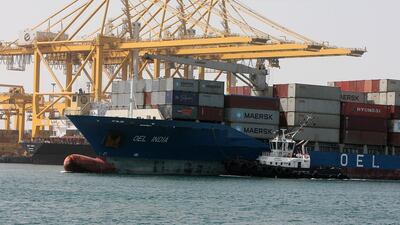SHARJAH // Shipping ports across the Middle East must be upgraded and increase their productivity to meet future growth in maritime trade, experts say.
There are almost US$30 billion (Dh110.19bn) of ports projects under way or about to be awarded in the region.
With container traffic on the rise, local ports will have to invest heavily in their infrastructure.
“Back in the late 1970s the concept of trunk shipment was born and container operators realised the importance of the Middle East as a hub,” said Saleem Kadernani, marketing manager at Gulftainer in Sharjah.
“Big vessels were able to feed the ports of the Gulf, East Africa, India and the Red Sea.
“But now things have changed and the average mainland vessel is larger because of the increase in cargo, requiring additional capacity.”
Mr Kadernani was speaking at the ninth Gulf Maritime conference, in Sharjah on Monday.
“As the population increased and they have been able to get more disposable income this led to a bigger demand, and that generated the influx of more cargo coming through,” he said.
“There has also been a change of the sourcing pattern in the past 10 years towards Asia and that created the need for bigger parcels of cargo to sail at the same time, because a lot of time now is being spent on the water.”
Huge trade flows from Asia to North America and Europe have increased the role of shipping.
And with nine seaports and the world’s third-largest re-export market, the UAE handles about half of all the containers in the entire region.
“We are witnessing a sea of activities in the Gulf waters,” said Ahmed Al Midfa, chairman of the Sharjah Chamber of Commerce and Industry.
“Expanding regional economies are seeing a rise in offshore developments, port expansions and mega infrastructure projects.”
Saif Al Midfa, chief executive of Sharjah’s Expo Centre, said: “The UAE’s transformation into a trading hub of the region was propelled mainly by its ports and strong maritime industry.
“From the very beginning the UAE had focused on its ports, logistics facilities and allied services, and the result is there to be seen in the phenomenal growth of the country.”
The shipping industry, which carries about 90 per cent of global trade, is responsible for almost 3 per cent of all man-made greenhouse carbon emissions.
But larger ships are expected to contribute to reducing that figure by 20 per cent by 2020, and 50 per cent by 2050.
“This is because vessels are much more fuel-efficient so you generally have a better impact on the environment,” Mr Kadernani said.
But these new vessels come with their own challenges.
“On the terminal side, we have to ensure that we’re equipped with the right equipment, the workflow and the people,” he said.
“There’s a paradigm shift for us to be in a position to cater to these vessels as they come along.
“In Khor Fakkan, we need to increase our productivity by 37 per cent to cater to these big vessels.”
But that will require a large investment.
“Investments have to be done in key cranes and equipment, dredging and land development,” Mr Kadernani said.
“We’re looking at extensive land development to move containers around in a systematic manner, to have enough room to move cargo from one ship to the land and this requires an efficient work area.”
That will cost the company $1bn.
“But it needs to be done for us to stay competitive,” Mr Kadernani said. “It’s important for UAE ports to maintain that kind of stance towards carriers and to offer them the alternative to bring big vessels to our hubs.
“Failure to invest could lead to harsh consequences, so we must learn in the Middle East to ensure that our competitiveness as a hub remains as it is today.”
cmalek@thenational.ae

